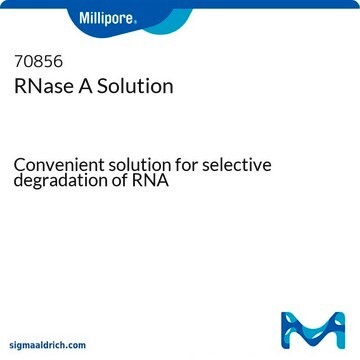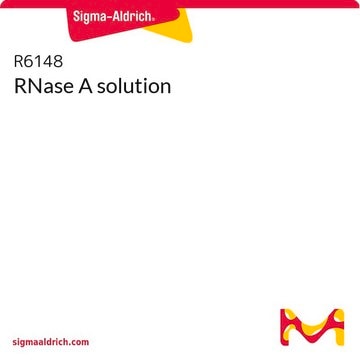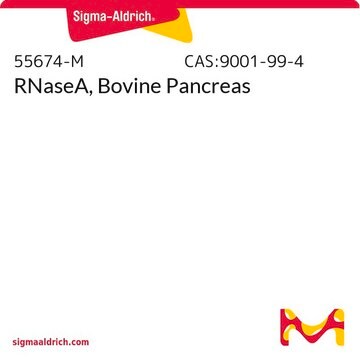RNASEA-RO
Roche
RNase A
from bovine pancreas
Synonym(s):
Rnase
Sign Into View Organizational & Contract Pricing
All Photos(1)
About This Item
Recommended Products
biological source
bovine pancreas
Quality Level
form
dry powder
specific activity
50 U/mg (+25°C, RNA as substrate)
mol wt
Mr = 13,700
packaging
pkg of 100 mg (10109169001)
pkg of 25 mg (10109142001)
manufacturer/tradename
Roche
parameter
65 °C optimum reaction temp.
technique(s)
flow cytometry: suitable
optimum pH
7.0-7.5
storage temp.
2-8°C
Related Categories
General description
Bovine pancreatic RNase A is a member of the RNase A protein superfamily. It is one of the most characterized proteins, and is a kidney shaped basic protein. This protein is composed of 124 amino acids. In its native form, RNase A exists as a homodimer.
Application
- For analytical purposes
- Isolation of DNA (for this purpose, RNase A should be boiled)
- For cell cycle analysis by flow cytometry and propidium iodide (PI) staining
Biochem/physiol Actions
RNase A catalyzes the transphosphorylation and degradation of RNA. It was the first protein identified to exhibit DNA melting functionality. This enzyme binds to several binding sites on single stranded (ss) RNA polynucleotide chain before degrading it. It interacts with ssDNA in a similar manner, which is responsible for its ‘DNA unwinding′ property. RNase A dimer obtained through tandemization shows toxicity to cancer cells.
Unit Definition
One unit is the enzyme activity that causes a decrease in absorbance of A0 to A1 within 1 minute under assay conditions. A0 to A1 corresponds to the total conversion, A1 being the final absorbance.
Reconstitution
RNase A can be dissolved at a concentration of 1 to 10 mg/ml in 10 mM Tris-HCl, pH 7.5, 15 mM NaCl, heated to 100 °C for 15 minutes to inactivate contaminating DNases and cooled slowly to room temperature and dispend into aliquots. Roche recommends subsequent storage at -15 to -25 °C.
Other Notes
For life science research only. Not for use in diagnostic procedures.
Storage Class Code
11 - Combustible Solids
WGK
WGK 1
Flash Point(F)
Not applicable
Flash Point(C)
Not applicable
Certificates of Analysis (COA)
Search for Certificates of Analysis (COA) by entering the products Lot/Batch Number. Lot and Batch Numbers can be found on a product’s label following the words ‘Lot’ or ‘Batch’.
Already Own This Product?
Find documentation for the products that you have recently purchased in the Document Library.
Customers Also Viewed
Christopher J Ott et al.
Blood, 120(14), 2843-2852 (2012-08-21)
We investigated the therapeutic potential of JQ1, an inhibitor of the BET class of human bromodomain proteins, in B-cell acute lymphoblastic leukemia (B-ALL). We show that JQ1 potently reduces the viability of B-ALL cell lines with high-risk cytogenetics. Among the
Simon Asbjørn Larsen et al.
Chemistry Central journal, 6(1), 18-18 (2012-03-20)
Various by-products of the cellular metabolism, such as reactive carbonyl species (RCS) are potentially harmful to cells and tissues, and play a role in many physiological and pathological processes. Among various RCS is the highly reactive dicarbonyl glyoxal (GO), which
Amit Kumar Dinda et al.
Journal of photochemistry and photobiology. B, Biology, 162, 535-543 (2016-08-01)
Several DNA binding proteins exist in dimeric form when bound with DNA to be able to exhibit various biological processes such as DNA repair, DNA replication and gene expression. Various dimeric forms of Ribonuclease A (RNase A) and other members
Bruno D Fonseca et al.
The Journal of biological chemistry, 290(26), 15996-16020 (2015-05-06)
The mammalian target of rapamycin complex 1 (mTORC1) is a critical regulator of protein synthesis. The best studied targets of mTORC1 in translation are the eukaryotic initiation factor-binding protein 1 (4E-BP1) and ribosomal protein S6 kinase 1 (S6K1). In this
Marieke Louwers et al.
Nature protocols, 4(8), 1216-1229 (2009-08-01)
Gene regulation in higher eukaryotes frequently involves physical interactions between genomic sequence elements tens of kilobases apart on the same chromosome but can also entail interactions between different chromosomes. Chromosome Conformation Capture (3C) is a powerful tool to identify such
Our team of scientists has experience in all areas of research including Life Science, Material Science, Chemical Synthesis, Chromatography, Analytical and many others.
Contact Technical Service






